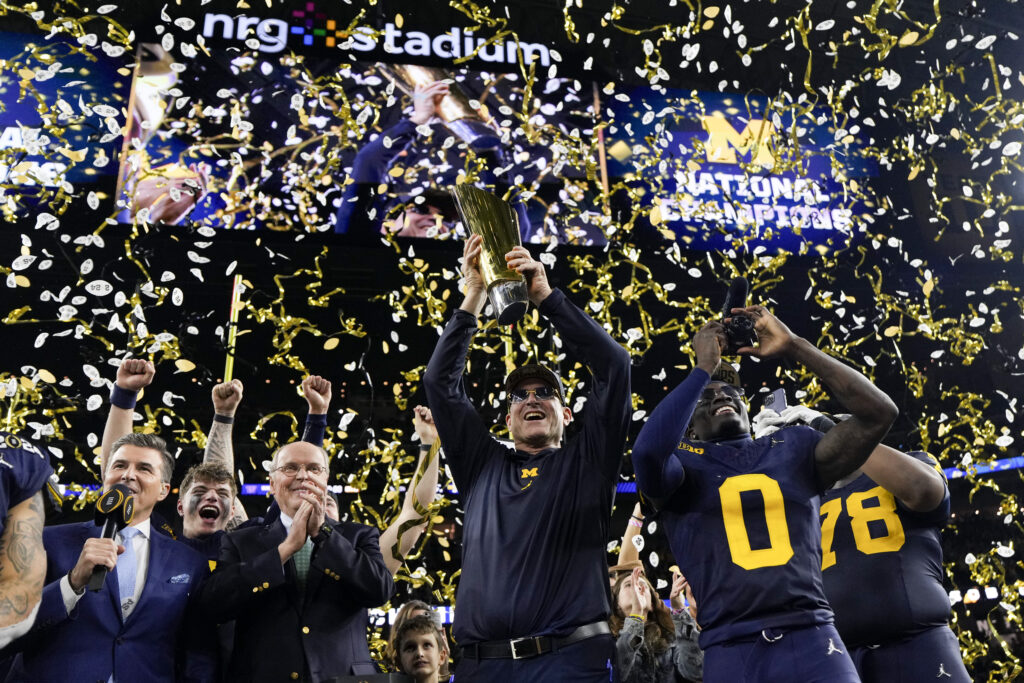Michigan won the final national championship of the College Football Playoff’s four-team format, beating Washington 34-13 on Monday night in Houston.
But the Big Ten won the era.
Well, the Big Ten and the SEC.
The sport’s richest conferences spent the past 2.5 years adding valuable chess pieces to their storied collections — to the point that they drove one rival league to collapse and two others to the brink of irrelevance.
And as the four-team playoff gives way to the 12-team event next season, the Big Ten and SEC stand alone with unprecedented control of the sport.
The playoff we just witnessed featured one school currently in the Big Ten (Michigan), one school entering the Big Ten next season (UW), one school currently in the SEC (Alabama) and one school entering the SEC next season (Texas).
And guess what: Their influence will only expand as the enlarged postseason event dominates the sport like nothing before it. (By comparison, the switch from the Bowl Championship Series to the four-team playoff barely registers.) The Big Ten and SEC will corner at least seven and potentially eight playoff berths in upcoming seasons.
They will own the top four seeds.
They will corner the market on opening-round home games.
And they will set the CFP’s revenue-sharing plan to ensure the cash follows the bids, thereby ensuring the rich get richer.
At this moment, the Wolverines stand alone, celebrating their first title in 26 years.
But against the backdrop of monumental changes to the landscape, Michigan is simply a vessel for growing Big Ten (and SEC) hegemony.
Other winners and losers from the bowl season …
Winner: Washington. One loss does not render moot the 14 victories (and countless thrills) that came before it. This was a season to celebrate, with quarterback Michael Penix Jr. solidifying himself as a Husky legend.
Loser: Michigan critics. The Wolverines were the team everyone loved to hate as coach Jim Harbaugh served two separate and distinct three-game suspensions. Obviously, he spent the time away perfecting his last laugh.
Winner: Harbaugh. Nine years and one week after he left the NFL to restore his alma mater to glory, the consummate Michigan Man has added a trophy to the case. He can name his price, either with the Wolverines or the assembled collection of NFL suitors. (We suspect it will be the latter.)
Loser: Ohio State. Because Michigan.
Winner: The Pac-12. The conference entered the 2023 season with soaring expectations — and it more than met the occasion. The final season of the Pac-12 (as we know it) was also memorable for what transpired on the field.
Loser: The ACC. Florida State’s controversial exclusion from the CFP was the obvious hit. But the conference went 5-6 in all bowl games and recorded just two wins against Power Five opponents.
Winner: ESPN. Too many bowl games? Try telling the network that broadcasts most of them. The ratings have more than justified the quantity of postseason games, with the Rose Bowl’s massive ratings (28 million viewers) providing the sport’s largest audience in six years.
Loser: CFP selection committee. We were dumbfounded by the decision to make Liberty the highest-ranked Group of Five team and remain completely perplexed. Slotting the Flames and their weak-sauce schedule ahead of SMU made no sense at the time and makes no sense now.
Winner: The Rose Bowl. Combine the massive ratings with the dramatic finish — Michigan beat Alabama in overtime — and the Granddaddy reminded everyone why it’s American sports royalty.
Loser: The SEC. The standard for success is impossibly high in the CFP era (i.e., national title or bust), and the failure to reach that bar in 2023 was noteworthy only because of all the previous times (six) the conference had succeeded in its endeavor.
Winner: Kalen DeBoer. Whatever dollar figure Washington targeted when contract negotiations with DeBoer began has presumably been lapped by reality. If the Huskies can keep him for anything less than $75 million, it’s a victory.
Loser: Ryan Day. The pressure on Ohio State’s fifth-year coach was soaring before the bowl season. Then the Buckeyes scored three points in a Cotton Bowl loss to Missouri and Michigan won the national title.
Winner: USC. Thanks to backup quarterback Miller Moss, who threw six touchdowns in the Holiday Bowl, the Trojans ended the season with a morsel of momentum and a not-terrible option to replace Caleb Williams.
Loser: Miami. The Hurricanes didn’t lure Mario Cristobal back home and pay him $8 million per year (reportedly) to finish 7-6 and lose to Rutgers in the Pinstripe Bowl.
Winner: Arizona. The Wildcats not only won the Alamo Bowl to secure their 10th victory of the season, they did it by conquering one of the sport’s bluebloods, Oklahoma. There’s enough momentum in Tucson to last another fall.
Loser: The Fiesta Bowl. Forced by the CFP selection committee to take the top-ranked team from the Group of Five, the Fiesta then sustained a second body blow when that team was identified: Liberty. The resulting blowout by Oregon was, unfortunately, easy to predict.
Winner: The Pop-Tarts Bowl. The Orlando-based event was originally known as the Blockbuster Bowl in the 1990s and has gone through multiple renditions. Suffice it to say, none have been as delicious as the current version. We couldn’t tell you which teams participated, or the final score, but you better believe we can describe every detail of that giant edible mascot.
|
ReplyReply allForward
|
Related posts:
 Wilner Hotline – Pac-12 on the brink: USC and UCLA expected to seek membership in the Big Ten
Wilner Hotline – Pac-12 on the brink: USC and UCLA expected to seek membership in the Big Ten
 VIDEO – Jon Wilner broke the UCLA/USC to Big Ten story, he went in-depth with Brad
VIDEO – Jon Wilner broke the UCLA/USC to Big Ten story, he went in-depth with Brad

FILE - Washington quarterback Michael Penix Jr. l (AP Photo/Stephen Brashear, File)
Report: Stanford, Cal, Oregon and Washington under consideration for membership in the Big Ten
Georgia head coach Kirby Smart (AP Photo/Hakim Wright Sr.)
Wilner Hotline – Way too early Top 25 college football rankings for the 2024 season: Georgia is No. 1, with Ohio State in close pursuiJon Wilner
Jon Wilner has been covering college sports for decades and is an AP top-25 football and basketball voter as well as a Heisman Trophy voter. He was named Beat Writer of the Year in 2013 by the Football Writers Association of America for his coverage of the Pac-12, won first place for feature writing in 2016 in the Associated Press Sports Editors writing contest and is a five-time APSE honoree.
